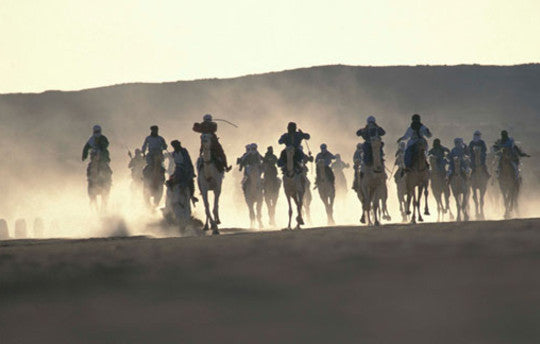Your Cart is Empty

Rai is a style born of strong local culture and uses street language to express opinions about life. Raiantagonises the values of ‘decent’ society and the cultural mainstream. As such, its path to international fame has been littered with controversy. As rai’s popularity rose the music lost much of its defiance, and yet it has retained a lot of its power.
Rai began in Western Algeria’s modern seaport, Oran, known as the ‘little Paris’ of North Africa. During the early 20th century, Algeria experienced great change and social upheaval. Traditional patterns of society were broken down and a new urban underclass was formed by poor factory workers. During this period of change, street poets began singing zendanisor bar songs that used bawdy rhymes and patches of improvised street wit covering every topic of concern including poverty, rural immigration, colonial misrule, unemployment, crime, and prostitution.
The word ‘rai’ loosely translates as an opinion, choice, advice or point. If stumped for the right phrase, the zendanissinger would use the cry ‘ya rai’ or ‘errai errai’ as if to say 'This is how I see the world.'
The society of the 1920s exploited Muslim women and forced them to survive in hostile surroundings. Some women, who had survived the harshest of upbringings, opted for a life of music as a cheikhain order to survive. They adopted a hybrid style that was individual, rough-neck, free-speaking and generally ‘shocking’. They also adopted Oranian street slang, interwoven with bits of French. Cheikha Remitti El Reliziana was the most notorious cheikha and claimed to be el ghedra (the root) of modern rai.
In the 1930s, rai adopted the influences of the recently available Egyptian records and latest French pop tunes, creating the urban hybrid wahrani. Seduced by the music and culture of the jazz age, rai incorporated Western instruments, such as piano and accordion.
Revolutionary fervour erupted in the mid-1950s and insurrection gripped the country. The cheikhas and wahrani stars were quick to add their voice to the protests. In the heat of the war of independence, many rai artists managed to make their first records.
In the 1960s, after a short periot of post-independence jubilatiion, Marxist theoreticians took a hard line against the libertine musicians and instead prompted a respectable 'national' music. Regional Oran TV stations were shut and bans were placed on concerts or gatherings of raimusicians. However, rai was always most comfortable in small gatherings and continued to survive and evolve.
The youth were becoming hooked on the latest sounds from Europe and America and rai had to be made danceable to retain its appeal. Sax, trumpet and the booming tabla drum were introduced. The post-revolutionary generation of young musicians formulated pop-rai by mixing rock, flamenco, jazz and the rai of the cheikhas. The first big stars of pop-rai were Chaba Fadela and Cheb Khaled.
By 1974, the cheap cassette recorders were available and allowed raito circumvent state-run media. Modern rai was born with Chaba Fadela’s recording, 'Ana ma h’lali ennoum' in 1979. The song was the first to be a hit nation-wide. Rai continued to grow in popularity and by 1986 it was an international phenomenon. Cheb Mami, was the first rai singer to perform in the US and record an album outside France or Algeria. In 1985, the first official rai festival was held in Oran and in 1986 a festival was held in Paris.
 Raï is to Oran and western Algeria what reggae is to Kingston and Jamaica: its soundtrack, its cultural ambassador and its pride. Originating in the hinterlands of Oran, which stretch from the Mediterranean Sea in the north to the Sahara desert in the south, it is the beat-driven, rebel pop music of Algeria. Raï’s popularity has spread throughout the world, led by the king (Cheb Khaled) and prince (Cheb Mami) of the genre, who both feature on this album. Combining contemporary instruments with Arabic music, raï is the essential sound of modern Algeria.
Raï is to Oran and western Algeria what reggae is to Kingston and Jamaica: its soundtrack, its cultural ambassador and its pride. Originating in the hinterlands of Oran, which stretch from the Mediterranean Sea in the north to the Sahara desert in the south, it is the beat-driven, rebel pop music of Algeria. Raï’s popularity has spread throughout the world, led by the king (Cheb Khaled) and prince (Cheb Mami) of the genre, who both feature on this album. Combining contemporary instruments with Arabic music, raï is the essential sound of modern Algeria.